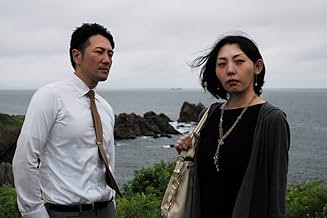AVALIAÇÃO DA IMDb
6,7/10
3,2 mil
SUA AVALIAÇÃO
Um homem é contratado para representar o pai desaparecido duma jovem.Um homem é contratado para representar o pai desaparecido duma jovem.Um homem é contratado para representar o pai desaparecido duma jovem.
- Prêmios
- 1 indicação no total
Yuichi Ishii
- Ishii Yuichi
- (as Ishii Yuichi)
Mahiro Tanimoto
- Mahiro
- (as Mahiro)
Avaliações em destaque
The film is a bit slow in places and there are some boring bits, but the concept itself is interesting. A man has an company who rents substitutes for fathers, businessmen, etc. He begins forming a relationship with the daughter of a wealthy, Yuri Kagami-esque woman who is a divorced widow, by pretending to be her father. Unfortunately it goes against his own company policy. Will he tell Mahiro the truth or become her actual father? The last few minutes of the film are the best.
There's a little bit of insight into Japanese racism, as Mahiro befriends a little girl for having dark skin.
The photography is beautiful. The vistas of Tokyo are stunning. It's definitely worth watching.
The photography is beautiful. The vistas of Tokyo are stunning. It's definitely worth watching.
The Wind Phone is a phone booth in Japan which people use to hold conversations with their loved ones lost in the tsunami of 2011. Here Herzog puts a woman on a cliff facing the ocean and gives her a receiver. "Did you speak with someone dead?, they ask her after she hangs up. "No. I tried instead to reach someone alive", she answers and you immediately recognize your communication with the living is as one-way as this. The existential solitude of modern man is on focus in this fine drama telling the invented story of a very real company called Family Romance which rents out actors to fill the gaps in our interpersonal relations.
An opportunity to witness Herzog's perfectly refined, and yet somewhat awkward style. Whilst the movie isn't riveting in a classical sense, the slow and constant rhythm draws us in.
There is a constant, permeating tension throughout the movie between reality and imitation. I found myself questioning this paradigm on two levels: To what extent is this movie a documentary? To what extent do the characters realistically portray family members?
As for the first question, the lines are extremely blurry. A family renting industry is known to exist, and Yuichi Ishii (the actor) is known to be the founder of one such company. Ishii claims the relationships throughout the movie are based on reality, but the New Yorker claims him to be unreliable. Nevertheless, the question itself is important and creates an uneasy tension as it plays and forth in our heads.
Ishii is clearly the standout in a cast of amateur actors. His performance is sensitive, realistic and almost paradoxically satirical (at times). He carries the story through to an emotional climax that poses yet more questions.
Herzog consistently uses complex metaphors and strong symbolism and a lot of the spiritual discourse of the movie can be found outside its dialogue (perhaps the result of Herzog directing in a second language).
In conclusion, give it a watch. It's a beautiful introduction to Herzog and will leave you with more questions posed than answered.
There is a constant, permeating tension throughout the movie between reality and imitation. I found myself questioning this paradigm on two levels: To what extent is this movie a documentary? To what extent do the characters realistically portray family members?
As for the first question, the lines are extremely blurry. A family renting industry is known to exist, and Yuichi Ishii (the actor) is known to be the founder of one such company. Ishii claims the relationships throughout the movie are based on reality, but the New Yorker claims him to be unreliable. Nevertheless, the question itself is important and creates an uneasy tension as it plays and forth in our heads.
Ishii is clearly the standout in a cast of amateur actors. His performance is sensitive, realistic and almost paradoxically satirical (at times). He carries the story through to an emotional climax that poses yet more questions.
Herzog consistently uses complex metaphors and strong symbolism and a lot of the spiritual discourse of the movie can be found outside its dialogue (perhaps the result of Herzog directing in a second language).
In conclusion, give it a watch. It's a beautiful introduction to Herzog and will leave you with more questions posed than answered.
I wanted to like this movie. The story is great and asks some serious questions about how we "act" in our everyday lives. However, the movie is quite hard to watch with many incredibly awkward scenes. It also looks a bit homevideo-y and the script is a quite thin.
...you will not understand how 'real' this film is. It may appear banal or even boring if you don't appreciate
how sensitive the Japanese are. For a society and culture as creative as Japan, the idea you would like to have someone who could 'fill in the gaps' in your life is quite possible. Werner Herzog was apparently influenced by an article in the NYT. I haven't read the article but I will try to find it, it is probably as interesting as the film. Wonderful images and roles.
BTW, if you haven't visited Japan, put it on you list of things to do, if possible.
BTW, if you haven't visited Japan, put it on you list of things to do, if possible.
Você sabia?
- CuriosidadesThe scene filmed at the station where Ishii Yuichi is reprimanded was filmed in one shot and the team dispersed after filming because they were filming without permission and the Security Team was coming to arrest them.
- Versões alternativasThe MUBI streaming (internet) version adds an 5' introduction by Herzog, and a 16' post interview with him by MUBI's Daniel Kasman.
- ConexõesReferenced in Film Junk Podcast: Episode 758: Cloud Atlas (2020)
Principais escolhas
Faça login para avaliar e ver a lista de recomendações personalizadas
Detalhes
Bilheteria
- Faturamento bruto mundial
- US$ 3.126
- Tempo de duração1 hora 29 minutos
- Cor
Contribua para esta página
Sugerir uma alteração ou adicionar conteúdo ausente




















